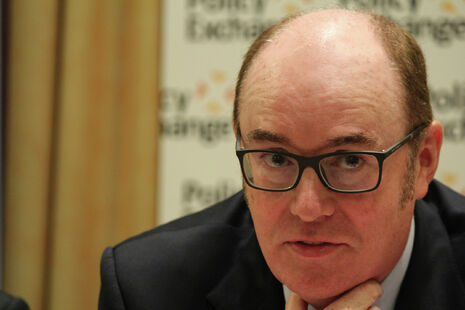Gerard Lyons: Now we have to make Brexit work
Christian Harvey talks to Boris Johnson’s former advisor about the difficulties and opportunities of Brexit, and the challenges that lie ahead for the UK’s capital city

Gerard Lyons isn’t a politician, but after serving as Boris Johnson’s Chief Economic Advisor during his final years as Mayor of London, he understands the tension between politics and economics.
Having grown up in Kilburn, Lyons was excited to serve his city’s continuing growth, but he says that the continuing urbanisation of the city is now becoming detrimental to further growth. “Almost half of real wages after taxes go towards rent,” he remarks, raising his eyebrows as if in shock. What does he think contributes to this?
“The fact is, the new Swiss bank account has become a London property.” Housing, according to Lyons, is now a “commoditised unit” – people’s homes are bought and sold in fistfuls, and it is this grabbing for more from international investors that leaves our housing stock woefully depleted.
His solution, then, is twofold: build more, and remove counter-intuitive taxes such as stamp duty which disincentivise older owners from downsizing, making them instead rent out and further distort the market.
But Lyons isn’t deaf to the other corners of the nation. He cites the productivity gap between London and the other UK cities as “significant”, and points to the fact that every UK city except London or Bristol has net emigration as a sign of London’s “magnetic pull”.
So how do we encourage growth elsewhere? “You have to make the vibe of the other cities attractive,” says Lyons. He moots devolution as an option, but, when reminded of the massive trend towards gentrification, he admits that “short-termism has been a bugbear for the UK”. But he still believes that politics shouldn’t get in the way of what is economically necessary.
Lyons believes in the future. He’s a family man, with a son reading Theology in his second year at Sidney Sussex College, and two daughters, one of whom is a stand-up comedian. Don’t his children want to follow in his footsteps as an economist? He smiles gently, and explains that “they must all do things they like – it’s sad to see young people drawn by the lure of the city and abandon their own value structure.”
Of course, Lyons is probably best known to Varsity’s readers as the co-founder of Economists for Brexit. What does he think of the chaos left in the wake of Brexit? “Leaving is an economic shock,” he admits, but “now, we’ve got the big challenge of making Brexit work.”
He argues that there have been some positives to Brexit: aside from all of the usual arguments about immigration and self-determination, Lyons thinks that the referendum campaign forced the Conservatives to visit areas that have historically been safe Labour seats, and vice versa, which may bring about interesting effects in terms of political change. Perhaps the upcoming by-election in Witney – David Cameron's seat – will prove him right.
Brexit or no Brexit, Lyons believes that tough times were in store in any case. “We are at the end of an economic cycle,” he says. “Seven years into a recovery is when growth starts to sputter.” Does he not believe that market volatility has been exaggerated by the vote, especially in the wake of the flash crash of the 6th October?
Perhaps, but as he points out, “the pound has gone from parity to two and half times the dollar before – big movements do happen.” He does concede, however, that, despite the Bank of England’s “stimulative policies”, “confidence is difficult to predict”, and the weaker purchasing power of the pound “may destabilise small business[es]” who do not hedge their currencies.
Overall, though, Lyons believes in our future capabilities outside the EU. “The UK economy is incredibly attractive,” he says, and as a British ambassador said to him recently: “Britain has never been so cheap, and the Chinese have never had so much money.” He wants to establish an international agenda to create interest in Britain and a domestic agenda to continue national growth and spread the wealth equally.
And of his home town? “London is still a global city,” he says. As an international hub of finance, it is unparalleled, and he doesn’t see that changing any time soon. Gerard Lyons is an optimist, and with the scope of the negotiations that are ahead of us, we need as many of those as we can get.
 News / Clare May Ball cancelled11 May 2025
News / Clare May Ball cancelled11 May 2025 News / Uni unveils new Physics faculty building 13 May 2025
News / Uni unveils new Physics faculty building 13 May 2025 Comment / Lectures are optional so give us the recordings14 May 2025
Comment / Lectures are optional so give us the recordings14 May 2025 Lifestyle / The woes of intercollegiate friendships8 May 2025
Lifestyle / The woes of intercollegiate friendships8 May 2025 News / Christ’s wins University Challenge for first time 13 May 2025
News / Christ’s wins University Challenge for first time 13 May 2025





